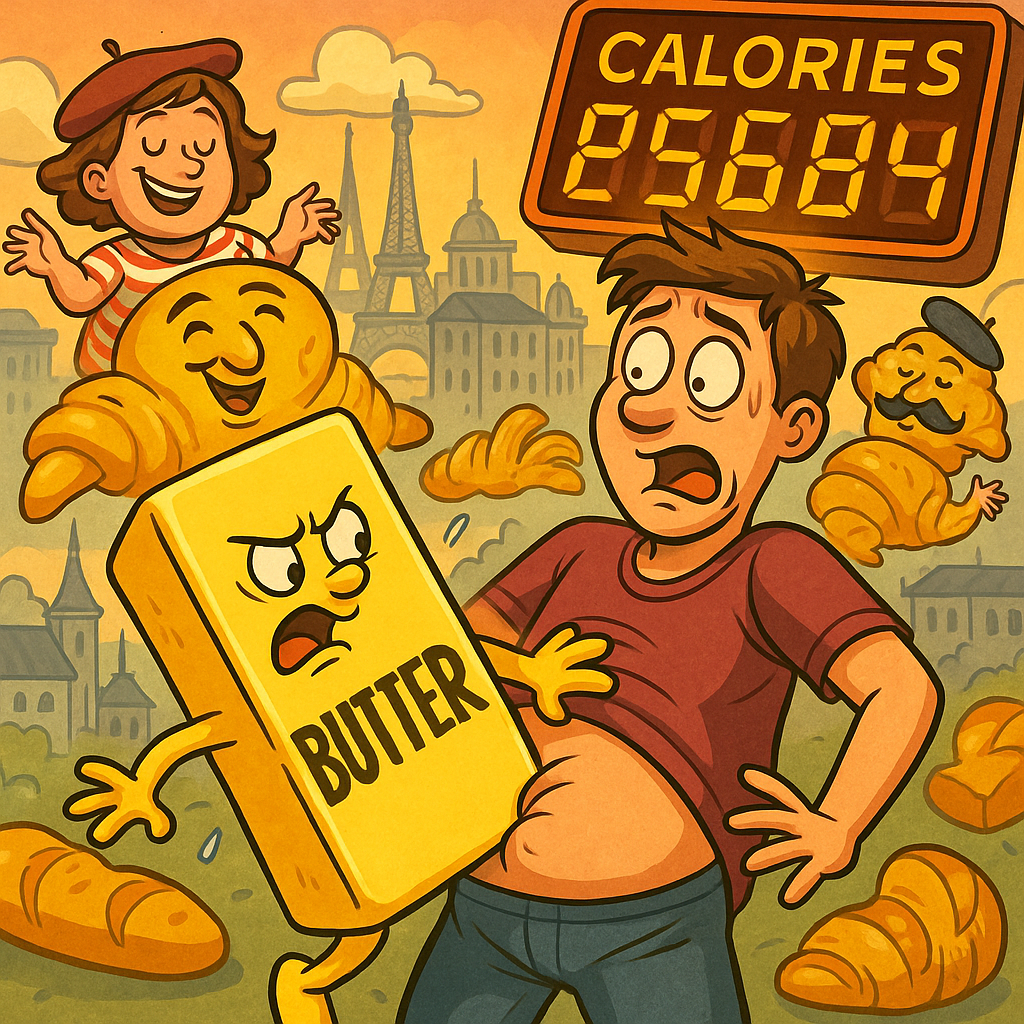Nutrition Myth #5: Fat Makes You Fat
Many believe eating fat directly causes fat gain. Learn why calories are the real factor, how fat supports hormones and vitamins, and why healthy fats are essential for performance and health.
NUTRITION
Adi English
3 min read


🥩 Nutrition Myth #5: “Fat Makes You Fat”
📖 Article (~320 words)
Ah yes, the old-school myth that refuses to die: eat fat, get fat. People still think butter looks at your belly and says, “Move over, I’m taking this spot.” If that were true, everyone in France, where people eat cheese and croissants daily, would be shaped like a giant wheel of brie by now.
Here’s the truth: fat doesn’t automatically make you fat. Eating too many calories makes you fat. Just like carbs, fat is simply another source of energy. If you eat more calories than your body burns, whether from nuts, bread, or steak, the extra gets stored as fat.
Now, let’s add nuance. Fat is calorie-dense—one gram of fat has nine calories, compared to four calories per gram of protein or carbs. That means it’s easier to overeat fatty foods because small amounts pack big energy. A handful of almonds? Great snack. Five handfuls? Surprise, you just had half your daily calories.
But fat isn’t the villain. It’s essential for your body. It supports hormones, helps your brain work properly, and allows your body to absorb fat-soluble vitamins like A, D, E, and K. Healthy fats from olive oil, avocado, nuts, and fish can even improve heart health.
The real problem? Ultra-processed foods that mix fat and sugar together—donuts, cookies, and fries. These are hyper-palatable, meaning they’re engineered to taste amazing and make you want more. That combo is what sneaks in extra calories, not the fat itself.
Fat is fuel, not a villain; if you walk, you mostly use fat as an energy source, not carbs. You need it for your hormones. So, fat won’t make you fat unless you treat peanut butter like it’s soup.
Takeaway: Fat is necessary for health and performance. Overeating calories is what leads to fat gain—not fat itself.
🗂 Vocabulary
Calories – units of energy in food.
Simple: The fuel that gives your body energy.
Example: Olive oil has many calories in a small amount.
Student example: ____________
Energy – power from food used by the body.
Simple: What keeps your body moving.
Example: Food gives the body energy to function.
Student example: ____________
Overeat – to eat more food than your body needs.
Simple: Eating too much.
Example: It’s easy to overeat nuts or chips.
Student example: ____________
Nine calories – the amount of energy in one gram of fat.
Simple: Fat has more calories per gram than protein or carbs.
Example: One gram of fat equals nine calories.
Student example: ____________
Hormones – chemical messengers in the body.
Simple: They control things like growth, mood, and energy.
Example: Fat is needed for healthy hormone function.
Student example: ____________
Fat-soluble vitamins – vitamins that need fat to be absorbed (A, D, E, K).
Simple: Vitamins stored in fat.
Example: Eating fat helps absorb vitamin D.
Student example: ____________
Heart health – the condition of your heart and blood vessels.
Simple: How strong and healthy your heart is.
Example: Healthy fats can improve heart health.
Student example: ____________
Hyper-palatable – designed to taste very good and make you want more.
Simple: Foods made to be irresistible.
Example: Donuts are hyper-palatable.
Student example: ____________
Combination – when two or more things are put together.
Simple: Mixing things.
Example: The combination of sugar and fat makes food easy to overeat.
Student example: ____________
Takeaway – the most important lesson or point.
Simple: The main thing to remember.
Example: The takeaway is that fat doesn’t directly make you fat.
Student example: ____________
📝 Exercises
Comprehension
Why do some people believe fat makes you fat?
What really causes fat gain?
Why is fat easier to overeat compared to carbs or protein?
What are fat-soluble vitamins?
What is the main takeaway of the article?
Multiple Choice
How many calories are in one gram of fat?
a) 2 b) 4 c) 7 d) 9 ✔
Which food has healthy fats?
a) Olive oil ✔ b) Candy c) Soda d) White bread
Why are donuts easy to overeat?
a) They are hyper-palatable ✔ b) They are full of vitamins
c) They are low in fat d) They are boring
Which vitamin is fat-soluble?
a) Vitamin C b) Vitamin D ✔ c) Vitamin B12 d) Vitamin K2
What does “takeaway” mean?
a) A food delivery b) The main lesson ✔ c) A snack d) The calories in food
Fill in the Blank
Fat has ______ calories per gram.
Eating more ______ than your body uses leads to weight gain.
Vitamins A, D, E, and K are ______ vitamins.
Healthy fats improve ______ health.
The main ______ is that fat itself isn’t the problem.
True/False
Fat automatically makes people fat. (False)
Fat has more calories per gram than protein or carbs. (True)
Fat is important for hormones and brain function. (True)
The combination of sugar and fat can make food easier to overeat. (True)
The article says to avoid fat completely. (False)
Discussion
Do you think people are still afraid of eating fat?
What are your favorite foods that contain healthy fats?
Why is it important to include fat in your diet?
How can someone avoid overeating fatty foods?
What is your personal takeaway from this article?
